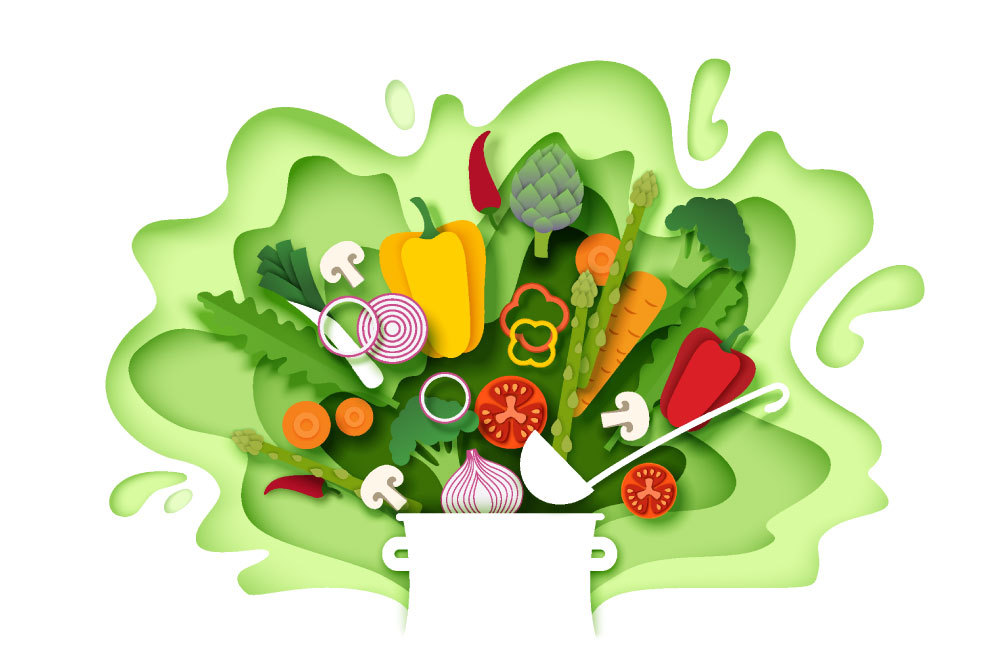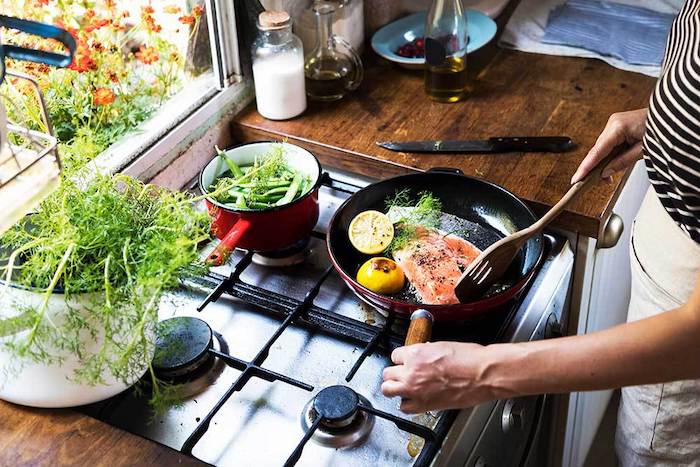Nutritional Tips for a Healthy Pregnancy

What foods the experts recommend incorporating into your diet when you’re expecting.
When we’re expecting, most of us want to do whatever we can to ensure the health of ourselves and our babies, and oftentimes that includes taking a look at our diets. There is a lot of advice on what a pregnant person should and should not eat—most of which sounds pretty straightforward on paper. But when it comes to real life, all the suggestions can be tough to remember—let alone stick to—when you’re cruising the aisles of your local supermarket
Candice Howarth, a holistic nutritionist and personal chef in Chicago, cautions against trying to do a sweeping overhaul of your diet as soon as you become pregnant because she says it “is a great way to set yourself up for failure.” Instead, she suggests starting small by making gradual changes over time. Not only will this set you up for greater success, but it will also help you stick to these changes even after you’ve delivered your baby.
So, grab a pen and some paper and get ready to write up a grocery list. Here are some prenatal must-haves to nutritionally support you and your growing baby during your pregnancy journey.
Prenatal Vitamin
First things first: a prenatal vitamin. If you haven’t already started a daily prenatal vitamin, then you need to get on it now because it will help fill in any nutritional gaps left out of your diet.
“A healthy diet is always important,” says Marissa Lippert MS, RD, a nutritionist working in New York City. “Prenatal vitamins are an added insurance policy and ensure that mom and baby are getting all the nutrients they both require for a healthy pregnancy.”
Christopher E. Bassil, MD, FACOG, an OB-GYN practicing in Atlanta, GA, agrees and explains that a good way to look at it is a prenatal vitamin works together with the food on your plate to give baby the healthiest possible start. “Prenatal vitamins are geared toward optimizing health and nutrients in the preconception and perinatal period,” he says. “The analogy I share with my patients is, ‘you can’t build a house without the bricks.’”
So, how do you know which vitamin is the right one for you? “There are a large variety of prenatal vitamins available to the population,” says Dr. Bassil, “much like buying a car, you may need to test drive a few before you find your optimal match.”
With so many selections at your fingertips, from chewable gummies to sippable drinks, you’re bound to find a prenatal suited to your health and lifestyle. You’ll want to make sure your prenatal hits all the recommended daily values for folic acid, calcium, iron, copper, vitamin C, zinc, vitamin B6, and vitamin D.
Folic acid is crucial for DNA development during the first trimester and aids in preventing neural tube defects (such as spina bifida), while iron promotes good blood flow through the placenta. Calcium and vitamin D are particularly important during the third trimester when your little one’s bones are growing at a rapid pace.
But more isn’t always better; even vitamins have their limits. “There are fat-soluble vitamins that in excess can actually be harmful to a developing fetus,” says Dr. Bassil. So don’t feel the need to double up if you miss a day—or if your lunch wasn’t as nutritious as it could have been.
Protein
Protein is good to eat at any time of the day, but Howarth particularly recommends starting your day with some to boost your energy level and sustain it over time. This is precisely what your body needs to refuel after a long night and to fight off the dreaded pregnancy fatigue.
“Eggs with veggies is an obvious option, but [you can] also try berries with whole milk yogurt and hemp seeds,” suggests Howarth, adding that the latter is great when you’re hungry but in a hurry. “You can have [it] on the go or keep [it] in your office fridge.”
Fruits and Vegetables
According to the American Pregnancy Association, a pregnant person should be consuming 2 to 4 servings of fruit and 4 servings of vegetables per day.
Howarth points out, squeezing all those servings into your daily meals doesn’t have to be complicated. She advises parents-to-be to have soup or salad with lunch or dinner most days of the week.
“This is an excellent way to sneak more produce and a wide variety of nutrients into your meals,” she explains. “Minestrone or a simple mixed green salad is an easy option you can find at most restaurants or have at home.”
Bonus: Prep work for soups and salads is typically minimal, and you can make a big batch that will last you a few days, saving you time later in the week.
Is your favorite fruit or veggie not in season? Not to worry—you can find them in the frozen section. Produce is frozen at the peak of ripeness to lock in the nutrients.
Whole Grains
The American Pregnancy Association recommends that a pregnant person gets between 6 to 11 servings of bread/grains per day, and while any grain will do, whole grains pack even more of a nutritious punch.
If gluten is a concern, Monica Bearden, RD, LD, a registered dietitian in Tomball, Texas, says to opt for brown rice, corn, quinoa, buckwheat, and amaranth.
Besides the healthy carbohydrates and fiber in whole grains, you get several nutrients important for your health and your baby’s developing systems, such as B vitamins for nervous system development, vitamin E for immune system development, magnesium for the immune system, teeth, and bone development, and iron for blood cell formation and an overall healthy pregnancy.

Dairy
This group is responsible for one of the greatest contributions to pregnant people’s diets in the U.S.: ice cream. Year-round, cold or hot, ice cream and pregnancy seem to go hand in hand.
Bearden notes that with all of this ice cream intake, you and your baby are getting carbs, protein, and calcium. However, an all-ice-cream diet isn’t exactly the most nutritious way to get your dairy. There are other foods in this group that can provide dairy’s important nutrients. For example, try yogurt and cheese.
Additionally, simply drinking milk can help do the trick because you get the very important nutrient vitamin D, which is not always found in other dairy foods.
Bearden suggests expecting parents to try eating or drinking at least 3 servings of dairy a day (1200 milligrams of calcium and 600 international units of vitamin D). For those who are lactose intolerant, try lactose-free milk, yogurt, and hard cheeses that have lower amounts of lactose. Fortified soy milk and supplements are additional options.
Cold Water Fatty Fish
The expectant crowd often hears conflicting advice about consuming fish during pregnancy, but don’t bypass the seafood counter because of your fear of mercury, Howarth cautions. “Instead of avoiding fish altogether, make smarter choices when choosing fish.”
Fish are loaded with healthy omega-3 fatty acids, as well as vitamins A and D—all of which are essential for babies’ developing brains. “Sardines, anchovy, and wild-caught salmon are some of the best foods for pregnancy,” Howarth says. Stick to smaller, non-predatory fish to steer clear of high mercury swimmers, like tuna and swordfish, which are best avoided during pregnancy.
Aim for 8 to 12 ounces of seafood a week (that’s about the size of two average meals) to meet the Food and Drug Administration’s (FDA) recommendations for pregnant women.
Hydration
Staying hydrated is especially important during pregnancy, and the American College of Obstetrics and Gynecology (ACOG) recommends a pregnant person drink 8 to 12 cups of water per day (that comes out to 64 to 96 ounces).
While water is your best bet for staying hydrated, it doesn’t always sit well during pregnancy. In that case, Bearden points out that hydration “does not just mean [plain] water.” Most drinks contain some water and you can also get water from fruits and vegetables.
Ginger for Morning Sickness
When morning (noon and night) sickness hits hard, ginger can be a lifesaver. But it has more benefits than easing the quease, notes Howarth. “Ginger is anti-inflammatory, helpful with digestion, and wonderful for your immune system.”
Clearly, there are loads of good reasons to add more ginger to your diet—and just as many ways to do it. If you’re not a fan of fresh ginger (or cooking), the beneficial root comes in other easy-to-swallow forms. Stow ginger mints in your purse in case of sudden nausea, and keep ginger tea at home and at your desk for quick relief.
Foods to Limit or Avoid
Regardless of whether or not you’re trying to make big changes to your diet for the sake of a healthy pregnancy, it’s very important for every pregnant person to know what foods should be avoided entirely or limited until after the baby is born.
First, while the cold water fish Howarth recommends are a good source of nutrients during pregnancy, not all fish is safe. The ACOG advises pregnant people not to eat fish with high levels of mercury, as they have been linked to birth defects. Fish in this category include bigeye tuna, king mackerel, marlin, orange roughy, shark, swordfish, or tilefish. Technically, tuna is safe in small quantities (no more than 6 ounces a week), but with so many other options, it may be easier to avoid this fish altogether.
In addition to fish containing mercury, the American Pregnancy Association also recommends expecting parents avoid raw and uncooked meat (including meat served rare), raw shellfish, and raw eggs. Deli meat, unpasteurized milk, pate, unpasteurized soft cheeses (these are usually imported), and refrigerated smoked seafood labeled lox, nova style, kippered, or jerky has the potential to contain listeria which can cause miscarriages and other birth defects and should be eliminated from your diet during pregnancy. Unpasteurized fresh-squeezed juice and unwashed vegetables should also be avoided.
Parents should also avoid caffeine entirely during the first trimester of pregnancy and then limit intake to 12 ounces per day (that’s about one cup of coffee) in the second and third trimesters. Finally, no amount of alcohol is safe to drink during pregnancy as it puts the baby at risk of developing fetal alcohol syndrome.
The time surrounding pregnancy can be wonderfully exciting—but also a bit overwhelming. The truth is, most of us know which foods pack the most nutrition, but no matter how devoted you are to a balanced diet, you’ll still find yourself binging on ice cream and Sour Patch Kids in the middle of the night (pregnancy cravings are fierce). By taking a daily prenatal vitamin and making a few simple adjustments to your diet, you can stress a little less and focus more on well-rounded nutrition. It’s all about finding the right balance that works for you.
“Think of this time as a chance to nourish your body and set the stage for a healthy pregnancy,” Howarth encourages. “Your body and baby will thank you.”
Original articles were published between 2011 and 2019 and have been updated by Ashley Ziegler.







